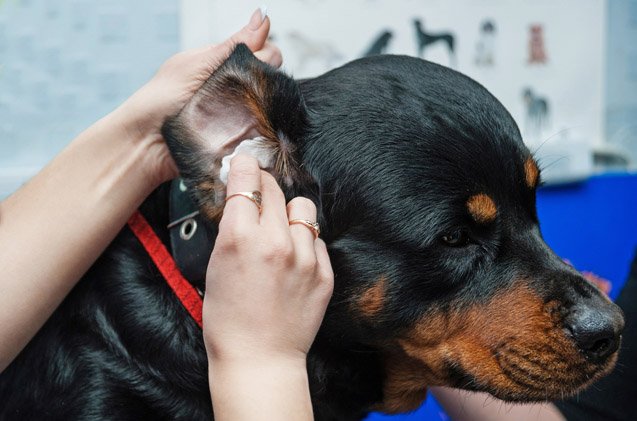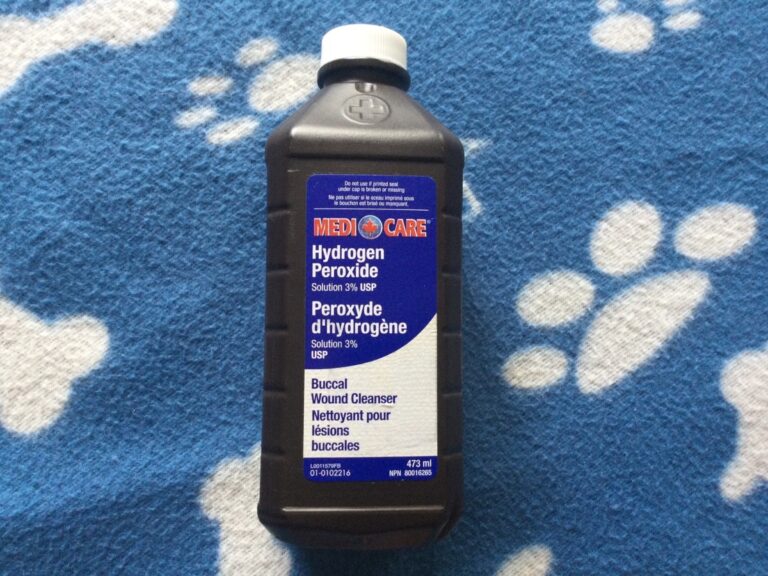No, it is not recommended to put peroxide in your dog’s ear as it can cause irritation and inflammation in the delicate ear canal. Stick to veterinary-approved ear cleaners instead.
Using hydrogen peroxide to clean your dog’s ears may seem like a convenient and inexpensive solution, but it can actually be harmful to your dog’s ears. The ear canal of dogs is sensitive and prone to irritation. Therefore, it is important to be cautious when cleaning your dog’s ears and to use products specifically designed for that purpose.
We will explore the reasons why peroxide should be avoided and discuss some alternative options for keeping your dog’s ears clean and healthy.
Why Using Peroxide Can Be Harmful For Your Dog’s Ears
Using peroxide to clean your dog’s ears can be harmful as it can cause irritation and inflammation to their delicate ear canal. It is recommended to use veterinary-formulated ear cleaners instead. Stick to safe and effective options to ensure the well-being of your dog’s ears.
Irritation And Inflammation
Using peroxide to clean your dog’s ears can lead to irritation and inflammation. The delicate tissues in the ear canal can be easily irritated by the harsh chemicals in peroxide, causing discomfort and potential damage. Dogs have sensitive ears, and using peroxide can disrupt the natural balance of the ear, leading to redness, swelling, and discomfort.
Damage To The Ear Canal
Another reason why using peroxide can be harmful for your dog’s ears is the potential for damage to the ear canal. The ear canal is a delicate and narrow structure that can be easily injured. Pouring peroxide directly into the ear canal can cause physical damage, such as cuts or abrasions, which can lead to pain, infection, and further complications.

Credit: www.amazon.com
Safe Alternatives For Cleaning Your Dog’s Ears
Cleaning your dog’s ears is an important part of their grooming routine. While many pet owners wonder if they can use peroxide to clean their dog’s ears, it is not recommended. Peroxide can be harmful to your dog’s delicate ear canal and may cause irritation and inflammation. Luckily, there are safe alternatives available for cleaning your dog’s ears. In this article, we will discuss two of the most popular options: vet-recommended ear cleaners and home remedies. Let’s explore these alternatives in more detail.
Vet-recommended Ear Cleaners
Veterinary experts highly recommend using ear cleaners specifically formulated for dogs. These ear cleaners are designed to effectively remove dirt, debris, and excess wax from your dog’s ears without causing any harm. Here are a few vet-recommended ear cleaners that you can consider:
| Product | Description |
|---|---|
| Veterinary Formula Clinical Care Ear Therapy | A professional strength ear cleaner that helps reduce odor and gently cleans the ears. |
| Zymox Ear Cleanser | A gentle, non-toxic ear cleanser with enzymes that help inhibit the growth of harmful bacteria and yeast. |
| Virbac Epi‑Optic Advanced Ear Cleaner | An advanced ear cleanser that helps remove excess wax and debris while maintaining the ear’s natural microbial balance. |
Home Remedies
If you prefer a more natural approach, there are also home remedies that can be used to clean your dog’s ears safely. Here are a few options:
- Warm water and a clean cloth: Gently wipe the inside of your dog’s ears with a soft cloth dampened with warm water. This can help remove dirt and debris.
- Diluted apple cider vinegar: Mix equal parts of apple cider vinegar and water. Use a cotton ball soaked in the solution to clean your dog’s ears. Apple cider vinegar has natural antibacterial properties.
- Diluted hydrogen peroxide: Although peroxide is not recommended for routine ear cleaning, it can be used in specific situations under veterinary guidance. Always dilute peroxide with water before using it on your dog’s ears.
It is important to note that while home remedies can be effective, they should be used with caution and under the guidance of a veterinarian. Some dogs may have sensitivities or allergies to certain ingredients.
Overall, keeping your dog’s ears clean and healthy is essential for their overall well-being. Whether you choose a vet-recommended ear cleaner or a home remedy, make sure to follow the instructions carefully and observe your dog’s ears for any signs of irritation or discomfort. If you are unsure or have any concerns, consult your veterinarian for professional advice.
Tips For Effectively Cleaning Your Dog’s Ears
Proper ear care is important for the health and well-being of your furry friend. Regular cleaning can help prevent infections, remove dirt and debris, and keep your dog’s ears fresh and odor-free. Here are some tips for effectively cleaning your dog’s ears:
Drying The Ears
After bathing your dog or if water gets into their ears during playtime, it’s essential to dry their ears thoroughly. Start by gently drying the outside of your dog’s ear with a soft towel. Avoid using a hairdryer as it may cause discomfort and potentially harm their sensitive ears.
Using An Ear Cleaner
Using a vet-recommended ear cleaner is an effective way to maintain your dog’s ear hygiene. These cleaners are specially formulated to break down wax, debris, and prevent bacterial growth. Before applying the cleaner, gently hold your dog’s ear flap and squeeze the recommended amount into the ear canal. Massage the base of the ear for about 30 seconds to distribute the cleaner.
Applying Medication
If your dog has a specific ear condition or infection, your veterinarian may prescribe medication. After cleaning your dog’s ears, carefully follow your vet’s instructions for applying the medication. Apply the recommended amount directly into the ear canal and massage the base of the ear to help the medication reach all affected areas. Remember to use only the specific medication prescribed for your dog’s condition.
Following these tips will help ensure your dog’s ears stay clean and healthy. Regularly monitoring your dog’s ears for any signs of redness, inflammation, odor, or discharge will help you catch and address any potential ear issues early on.

Credit: www.petguide.com

Credit: www.amazon.com
Frequently Asked Questions Of Can I Put Peroxide In My Dog’s Ear
What Can I Use To Clean My Dog’s Ears At Home?
It is not recommended to use hydrogen peroxide to clean your dog’s ears. Stick to veterinary-approved ear cleaners for safe and effective cleaning.
Is It Safe To Clean Your Dog’s Ears With Hydrogen Peroxide?
It is not safe to clean your dog’s ears with hydrogen peroxide. It can cause irritation and inflammation to their delicate ear canal. Stick to veterinary-formulated ear cleaners instead.
How Do You Get Fluid Out Of A Dog’s Ear?
To remove fluid from a dog’s ear, start by drying the outside of the ear gently with a towel. Then, use a vet-recommended ear cleaner to clean the ear, wiping off any excess cleaner. After cleaning, apply any prescribed medication.
Avoid using hydrogen peroxide as it can cause irritation and inflammation. Stick to veterinary-formulated ear cleaners.
What Is The Best Ear Cleaner For Dogs?
The best ear cleaner for dogs includes Veterinary Formula Clinical Care, Zymox Ear Cleanser, and Virbac Epi‑Optic Advanced. Avoid using hydrogen peroxide as it can be harmful to your dog’s delicate ear canal. Stick to veterinary-formulated ear cleaners.
Conclusion
Not safe to put peroxide in your dog’s ear. Although peroxide can remove dirt and debris, it can also harm the delicate ear canal, causing irritation and inflammation. Instead, stick to vet-recommended ear cleaners specifically designed for dogs. Proper and gentle cleaning, along with veterinary-approved products, will ensure the health and well-being of your furry friend’s ears.



